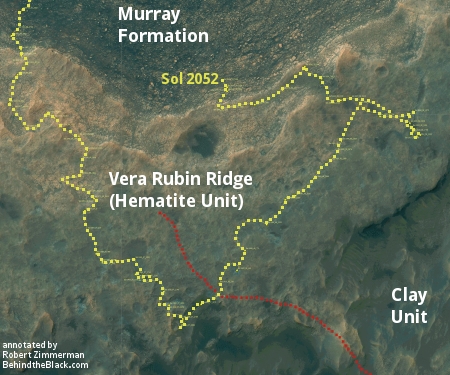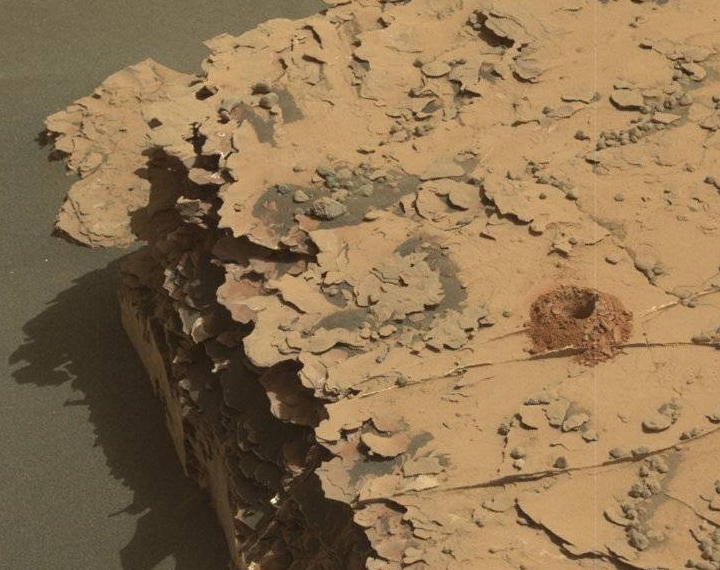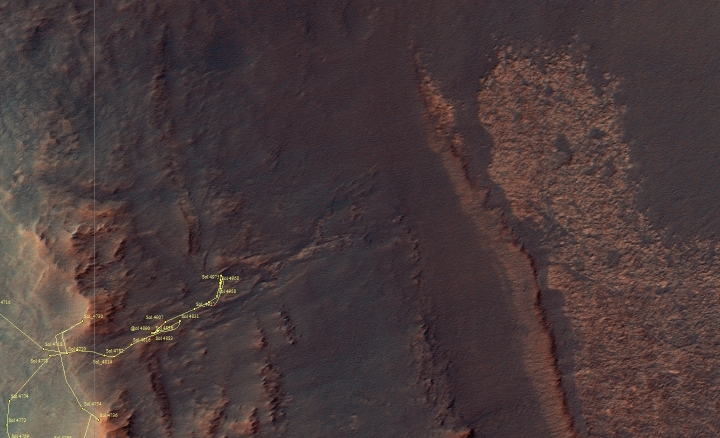Mars rover update: May 23, 2018
Summary: Curiosity drives down off of Vera Rubin Ridge to do drilling in lower Murray Formation geology unit, while Opportunity continues to puzzle over the formation process that created Perseverance Valley in the rim of Endeavour Crater.
For a list of past updates beginning in July 2016, see my February 8, 2018 update.
Curiosity

For the overall context of Curiosity’s travels, see Pinpointing Curiosity’s location in Gale Crater.
Since my April 27, 2018 update, Curiosity has continued its downward trek off of Vera Rubin Ridge back in the direction from which it came. The annotated traverse map to the right, cropped and taken from the rover’s most recent full traverse map, shows the rover’s recent circuitous route with the yellow dotted line. The red dotted line shows the originally planned route off of Vera Rubin Ridge, which they have presently bypassed.
It appears they have had several reasons for returning to the Murray Formation below the Hematite Unit on Vera Rubin Ridge. First, it appears they wanted to get more data about the geological layers just below the Hematite Unit, including the layer immediately below, dubbed the Blunts Point member.
While this is certainly their main goal, I also suspect that they wanted to find a good and relatively easy drilling candidate to test their new drill technique. The last two times they tested this new technique, which bypasses the drill’s stuck feed mechanism by having the robot arm itself push the drill bit against the rock, the drilling did not succeed. It appeared the force applied by the robot arm to push the drill into the rock was not sufficient. The rock was too hard.
In these first attempts, however, they only used the drill’s rotation to drill, thus reducing the stress on the robot arm. The rotation however was insufficient. Thus, they decided with the next drill attempt to add the drill’s “percussion” capability, where it would not only rotate but also repeatedly pound up and down, the way a standard hammer drill works on Earth.
I suspect that they are proceeding carefully with this because this new technique places stress the operation of the robot arm, something they absolutely do not want to lose. By leaving Vera Rubin Ridge they return to the more delicate and softer materials already explored in the Murray Formation. This is very clear in the photo below, cropped from the original to post here, showing the boulder they have chosen to drill into, dubbed “Duluth,” with the successful drill hole to the right.

As is obvious, “Duluth” has a decidedly fragile and soft appearance. With this choice, the engineers increased the chances the drilling will work (which it did), while also getting themselves some data on the limits they face with this new drilling technique. It could be that they need more information for applying the right pressure with the robot arm, while the drill both rotates and hammers, and drilling first on a softer target allows them to get that information while taking the least risks.
While this new test has obtained their first drill samples since October 2016, getting that sample into the rover’s test laboratories still requires refinement, as they will be doing it in a different manner than when the feed mechanism was working.
Where Curiosity goes next is unclear. Eventually it will head back across Vera Rubin Ridge and up the mountain. When that happens remains a decision for the Curiosity science team.
Opportunity
For the context of Opportunity’s recent travels along the rim of Endeavour Crater, see my May 15, 2017 rover update.

As it has since November 2017, Opportunity continues to sit about halfway down the rim of Endeavour Crater, inside Perseverance Valley, as shown on the traverse map above, taken on Sol 4997, almost a 100 sols back.
Though winter is slowly ending, the rover’s travels continued to be somewhat restricted because of the limited sunlight available during winter to charge its solar-powered batteries. Nonetheless, they have been moving the rover up and down the valley, doing careful analysis of a variety of locations and rock types in an effort to pin down the geology that created this valley.
After experiencing some slippage in an attempt to reach some “tablular rocks” uphill from the rover, as noted in my last update, the science team chose a different route and eventually reached them. Since then it has been taking close up images.
Overall, the science team is finding the origin history of Perseverance Valley to be complex and somewhat difficult to untangle. The valley could have been formed by wind, water, or even ice, flowing down the rim of the crater, but the geology they are finding in the valley itself also appears to include some volcanic melts as well as debris from past impacts, and is thus not providing them a clear answer. As explained to me by Bill Farrand of the rover science team,
Opportunity has found evidence among the rocks in Perseverance Valley of the effect of the action of an eroding agent, certainly wind to some extent, but the action of water is still very much a possibility. Some of the rocks examined appear to be formed from impact ejecta, either from the formation of Endeavour crater itself, or more distant crater(s), and some pitted rocks could be a form of volcanic rock or impact melt. Some of the pitted rocks appear to have coatings which could be indicative of past rock/volatile interactions
The last sentence refers to coatings on some rocks that suggest some kind of interaction between the atmosphere and the rock’s surface.
There is also the possibility, though quite slim based on the data so far, that some of the erosion features they have found might also have been caused by ice flowing downhill. This is not a favored theory, but it cannot be dismissed entirely.
In other words, the geology here, even with a close look, is alien, and somewhat baffling. They pick at it as best they can, using a rover intended to work only 90 days that is now been operating more than fifty times longer, at a distance millions of miles away.
On Christmas Eve 1968 three Americans became the first humans to visit another world. What they did to celebrate was unexpected and profound, and will be remembered throughout all human history. Genesis: the Story of Apollo 8, Robert Zimmerman's classic history of humanity's first journey to another world, tells that story, and it is now available as both an ebook and an audiobook, both with a foreword by Valerie Anders and a new introduction by Robert Zimmerman.
The print edition can be purchased at Amazon or from any other book seller. If you want an autographed copy the price is $60 for the hardback and $45 for the paperback, plus $8 shipping for each. Go here for purchasing details. The ebook is available everywhere for $5.99 (before discount) at amazon, or direct from my ebook publisher, ebookit. If you buy it from ebookit you don't support the big tech companies and the author gets a bigger cut much sooner.
The audiobook is also available at all these vendors, and is also free with a 30-day trial membership to Audible.
"Not simply about one mission, [Genesis] is also the history of America's quest for the moon... Zimmerman has done a masterful job of tying disparate events together into a solid account of one of America's greatest human triumphs."--San Antonio Express-News

